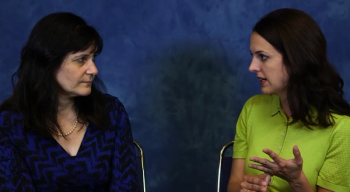
Undergoing autologous hematopoietic stem cell transplantation was effective and safe in patients with refractory multiple myeloma, including those patients who are refractory to both proteasome inhibitors and immunomodulatory agents.

Your AI-Trained Oncology Knowledge Connection!


Undergoing autologous hematopoietic stem cell transplantation was effective and safe in patients with refractory multiple myeloma, including those patients who are refractory to both proteasome inhibitors and immunomodulatory agents.

In this video, Gareth J. Morgan, MD, discusses the new biologic advances in multiple myeloma and how they are currently being applied to clinical practice.

The FDA has approved daratumumab in combination with pomalidomide and dexamethasone for the treatment of relapsed or refractory multiple myeloma.

Combining bendamustine, pomalidomide, and dexamethasone achieved a promising overall response rate in patients with heavily pretreated lenalidomide refractory multiple myeloma, according to the results of a phase I/II trial.

Lenalidomide plus rituximab induction therapy followed by maintenance appears to provide favorable activity and a tolerable safety profile in follicular lymphoma patients who are double-refractory or had early relapse after initial diagnosis.

Over recent years, there has been much progress in elucidating the biology of these lymphomas, and this has paved the way for novel therapies that are currently under investigation in clinical trials.

In this peer-to-peer discussion two experts discuss the nuances and challenges of treating elderly patients with myeloma, and why therapies need to be tailored based on frailty status rather than age.

CAR T-cell therapy may have a role in combating relapsed/refractory multiple myeloma, according to new data from a phase I study presented at the 2017 ASCO Annual Meeting, held June 2–6 in Chicago.

Anti-CD19 CAR T-cell therapy may benefit patients with aggressive B-cell non-Hodgkin lymphoma who have relapsed or are refractory to standard therapy.

This video examines the targeting of IDH1/IDH2 mutations in patients with relapsed or refractory acute myeloid leukemia.

Although hematologic oncologists see the value in hospice, their concerns about the adequacy of services for their patients with blood cancers may limit hospice referrals.

Brentuximab vedotin, a monoclonal antibody-drug conjugate, combined with gemcitabine may be a new treatment option for children and AYAs with relapsed or refractory Hodgkin lymphoma.

The combination of the anti-CD38 monoclonal antibody isatuximab with pomalidomide/dexamethasone had an acceptable and manageable safety profile in patients with relapsed or refractory multiple myeloma.

A fifth course of cytarabine chemotherapy resulted in improved overall and disease-free survival in pediatric patients with low-risk acute myeloid leukemia.

This video presents updated results of two phase III trials in relapsed or refractory multiple myeloma, showing the impact of daratumumab combinations across cytogenetic risk groups.

Researchers are making much-needed progress in developing treatments for patients with three rare malignancies: recurrent and refractory primary central nervous (CNS) system lymphoma, secondary CNS lymphoma, and primary vitreoretinal lymphoma.

This video highlights results of the BFORE trial, which tested bosutinib vs imatinib in newly diagnosed chronic myeloid leukemia patients.

Prognostic somatic copy number alterations in diffuse large B-cell lymphoma can be detected and monitored noninvasively using ctDNA from patient plasma.

In this interview we discuss the standard of care and current treatment options for patients with multiple myeloma.

Chromosomal abnormalities such as a variant t(9;22) translocation do not appear to have significant prognostic impact on children with chronic myeloid leukemia.

The stem cell transplantation utilization rate in the United States increased from 2008 to 2014, but was lower among Hispanics and non-Hispanic blacks compared with non-Hispanics whites.

Researchers at Weill Cornell Medicine are reporting that they have successfully converted cells from blood vessels in mice into blood-forming stem cells.

Combination treatment with pembrolizumab, pomalidomide, and low-dose dexamethasone resulted in durable responses in patients with relapsed or refractory multiple myeloma.

This review will highlight the survival impact that rituximab therapy has had on major lymphoid malignancies, such as diffuse large B-cell lymphoma, chronic lymphocytic leukemia/small lymphocytic lymphoma, follicular lymphoma, and mantle cell lymphoma. We will also discuss alternative anti-CD20 monoclonal antibodies.

Given the benefit of rituximab to patients, it will be important that the use of biosimilar compounds not compromise the efficacy of treatment. However, measures to improve access to anti-CD20 therapy in a cost-effective manner will clearly provide benefit to patients with lymphoma.